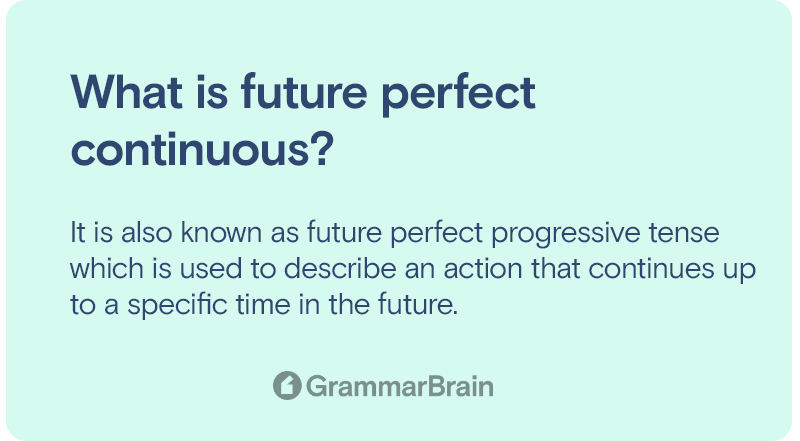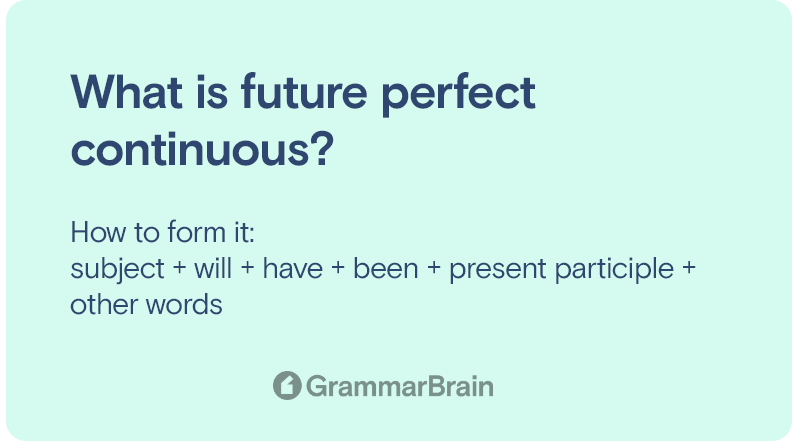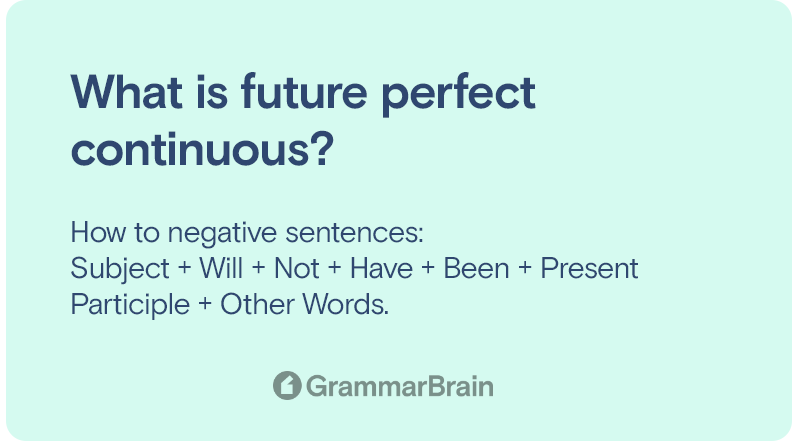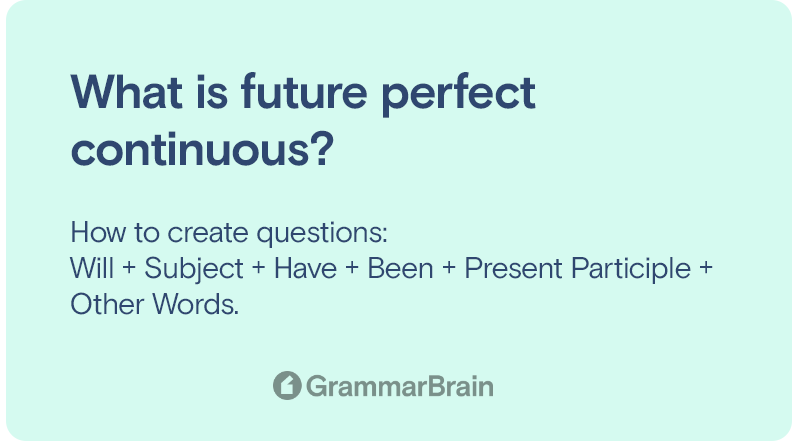What is future perfect continuous tense? How does it work? What are the ways to form a future perfect continuous sentence? These are all great questions that you probably have when you think about this verb tense. Get these questions answered and more in this comprehensive guide on the future perfect continuous verb tense.

What is a future perfect continuous tense?
It is also known as future perfect progressive tense which is used to describe an action that continues up to a specific time in the future.
Here is the structure of the future perfect continuous sentence.

Structure and examples of future perfect continuous
It is formed using “subject + will + have + been + present participle + other words”.
Here are a few examples of future perfect continuous.
Seven examples of future perfect continuous
- Shawn will have been preparing food for more than one hour when James arrives. In this example, Shawn will be continuing the action of preparing food for more than an hour by the time James comes.
- Kurt will have been sitting in the restaurant for two hours by four ‘o’clock. Here, Kurt will be continuing the action of sitting in the restaurant and by 4 ‘ o’clock, the time spent will be two hours.
- Next year he will have been working for the company for three years. In this sentence, the person will be continuing the action of working in the company, and by next year he will complete three years in the company.
- By 2023, Amelie will have been completing her graduation. In this example, Amelie will be continuing her studies and by 2023 she will complete her graduation.
- Next month, she will have been getting treatment for asthma for six months. In this sentence, the girl will be continuing her treatment of asthma, and in the next month, it will be six months of treatment.
- The teacher will have been teaching at the school for twenty years, next year. Here, the teacher will be continuing the action of teaching and by next year she will complete twenty years of teaching at the school.
- She will have been staying in the single-room apartment for three years by 2023. In this example, the person will be continuing the action of living in the single-room flat and by 2023, she will complete three years of living in the flat.
Difference between future perfect and future perfect continuous
Here is the difference between future perfect and future perfect continuous:
- The future perfect is used to describe a future action that will be completed before a second future action. On the other hand, future perfect continuous tense describes an action that continues up to a certain point in the future.
- An example of future perfect is “She will have finished homework by the time her mom returns home”. Here the person will complete the action of finishing homework before her mother returns home. An example of future perfect continuous is “Sam will have been spending time in the mall for five hours by 8 ‘o’clock”. Here, action is still continuing in the future till 8.
Difference between the two perfect continuous tenses – Past and Future
- The past perfect continuous describes an action that took place for a span of time in the past before the second action started. On the other hand, future perfect describes an action that continues in the future but till a particular time period.
- An example of past perfect continuous is “we had been looking for the bag for three hours when Sam told us he found it”. The action of searching for the bag began in past and continued until Sam found the bag. An example of future perfect continuous is “She will have been living in the penthouse for two years by next year”.
- The formula for past perfect continuous is “subject + had + been + verb (-ing) + other words”. On the other hand, the formula for future perfect continuous tense is “subject + will + have + been + present participle + other words”.
Difference between the future perfect continuous and the present perfect continuous
- Present perfect continuous is a verb tense that describes an action that began in past and has continued in present. The action will continue or may have ended in the present. In comparison, the future perfect continuous tense describes an action that is continuing into the future until a particular time.
- An example of present perfect continuous is – “He has been studying at the same college for 5 years”. The person started studying at the college in past and is still studying in the same college in present as well. On the other hand, an example of a future perfect continuous is “By 2023, he will have been doing his graduation for four years”.

How to create negative sentences using future perfect continuous
It is possible to create negative sentences using future perfect continuous. To create them, the negative word “not” is used between “will” and “have”. Here is the formula for creating negative sentences using future perfect continuous.
Formula: Subject + Will + Not + Have + Been + Present Participle + Other Words.
Examples:
- I will not have been living in New York the next month. In this example, the person will not continue living in New York when the next month comes.
- By 2023, Sam will not have been using his friend’s car. Here, the person, by 2023, will not continue using his friend’s car.
- In the next month, she will not have been living in a single-room apartment. In this sentence, the person will not continue living in a single-room apartment in the next month.
How to create questions using future perfect continuous
To create questions with future perfect continuous, the subject position is exchanged with “will”. Here is the formula.
Formula: Will + Subject + Have + Been + Present Participle + Other Words.
Examples:
- By next year, will Shawn have been living in London for fifteen years? In this example, the question asked is, will Shawn be continuing to live in London for fifteen years, next year?
- Will Amelie have been writing the exam for three hours by 6 P.M today?
- Will she have been eating meat for three weeks?

What are the uses of future perfect continuous?
Here are a few uses of the future perfect continuous tense.
- Describing an action that will be the cause of another action that will take place in the future.
Examples:
She thinks her brother will be tired as he will have been walking for three hours straight.
Sam will become thin by next year because he will have been working out for many years.
- It is used to describe how long an action will continue in the future.
Example:
Sam will have been living in New York for five years by the time he leaves for London.
Differences between future perfect continuous and other verb tenses
Here is a simple way to understand the various verb tenses and their functions:
| Tense | Function | Rule | Example |
| Present simple | Helps to describe habits, facts, actions, and truth that are not affected by time | Ist form of verb + s/es | He loves pizza. |
| Past simple | Helps to describe events that have happened in the past | IInd form of the verb | She wore a beautiful dress for the party. |
| Future simple | Helps to describe events that will happen in the future | Will/ shall + Ist form | He will go to New York tomorrow. |
| Present perfect | Helps to describe the relevance of past events in the present moment | Has/ have + IIIrd form of the verb | I have learned to ride a bike. |
| Past perfect | Helps to describe events that happened prior to other events in the past | Had + IIIrd form of the verb | She had finished the paper before leaving the hall. |
| Future perfect | Helps to describe events that will be completed between now and a specific point in the future | Will/ have + IIIrd form of the verb | She will have finished the book by tomorrow. |
| Present continuous | Helps to describe ongoing actions | Is/ am/ are + Ist form + ing | She is reading a book. |
| Past continuous | Helps to describe ongoing events of the past, mostly in relation to another event | Was/ were + Ist form + ing | He was driving to work when the accident happened. |
| Future continuous | Helps to describe future events that will/are expected to continue for a period of time | Will be + Ist form + ing | I will be going to meet my grandparents tomorrow. |
| Present perfect continuous | Helps to describe events that started in the past and will continue into the present | Has/ have been + Ist form + ing | She has been writing a book for the past one year. |
| Past perfect continuous | Helps to describe events that began, continued, and ended in the past | Had been + Ist form + ing | I had been working in this company for ten years when I got the promotion. |
| Future perfect continuous | Helps to describe events that began in the past but will continue until a point in the future | Will/ shall have been + Ist form + ing | I will have been doing business with her for one year. |
FAQs
1. What time expressions are used in future perfect continuous tense?
2. How many tenses are there in English?
English grammar consists of three main tenses which are present, past, and future. These three tenses are further subdivided into four tenses which are simple tense, continuous tense, perfect tense, and perfect continuous tense. In totality, there are twelve tenses.
12 tenses in the English language:
- The Simple Present Verb Tense
- The Present Continuous Verb Tense
- The Present Perfect Verb Tense
- The Present Perfect Continuous Verb Tense
- The Simple Past Verb Tense
- The Past Continuous Verb Tense
- The Past Perfect Verb Tense
- The Past Perfect Continuous Verb Tense
- The Simple Future Verb Tense
- The Future Continuous Verb Tense
- The Future Perfect Verb Tense
- The Future Perfect Continuous Verb Tense
3. Can we contract future perfect continuous?
Yes, contraction is possible with future perfect continuous tense. In this case, the subject and the helping verb “will” are contracted.
Examples:
- “I will” is contracted to “I’ll”.
- “He will” is contracted to “He’ll”.
- “You will” is contracted to “You’ll”.
- “They will” is contracted to “They’ll”.
- “We will” is contracted to “We’ll”.
- “She will” is contracted to “She’ll”.
- “It will” is contracted to “It’ll”.
In this tense, even negative sentences are contracted. In such sentences, the “will” and “not” are contracted. “Will not” is contracted to “Won’t”.
Examples:
- “I will not” becomes “I won’t”.
- “She will not” becomes “She won’t”.
- “They will not” becomes “They won’t”.
- “He will not” becomes “He won’t”.
- “You will not” becomes “You won’t”.
4. What shouldn’t be used with future perfect continuous?
Nonaction verbs like being and knowing should not be used with future perfect continuous tense. For example, “he will have been knowing you for a month by next month”. Such a nonaction verb shouldn’t be used, instead, it is suited for future perfect tense. For example, “he will have known you for a month by next month”.
Sources
- Future Perfect Continuous: Definition, Rules and Useful
- Future Perfect Continuous | Grammarly
- Future perfect continuous | EF | Global Site
Inside this article
Fact checked:
Content is rigorously reviewed by a team of qualified and experienced fact checkers. Fact checkers review articles for factual accuracy, relevance, and timeliness. Learn more.
Core lessons
Glossary
- Abstract Noun
- Accusative Case
- Anecdote
- Antonym
- Active Sentence
- Adverb
- Adjective
- Allegory
- Alliteration
- Adjective Clause
- Adjective Phrase
- Ampersand
- Anastrophe
- Adverbial Clause
- Appositive Phrase
- Clause
- Compound Adjective
- Complex Sentence
- Compound Words
- Compound Predicate
- Common Noun
- Comparative Adjective
- Comparative and Superlative
- Compound Noun
- Compound Subject
- Compound Sentence
- Copular Verb
- Collective Noun
- Colloquialism
- Conciseness
- Consonance
- Conditional
- Concrete Noun
- Conjunction
- Conjugation
- Conditional Sentence
- Comma Splice
- Correlative Conjunction
- Coordinating Conjunction
- Coordinate Adjective
- Cumulative Adjective
- Dative Case
- Determiner
- Declarative Sentence
- Declarative Statement
- Direct Object Pronoun
- Direct Object
- Diction
- Diphthong
- Dangling Modifier
- Demonstrative Pronoun
- Demonstrative Adjective
- Direct Characterization
- Definite Article
- Doublespeak
- False Dilemma Fallacy
- Future Perfect Progressive
- Future Simple
- Future Perfect Continuous
- Future Perfect
- First Conditional
- Irregular Adjective
- Irregular Verb
- Imperative Sentence
- Indefinite Article
- Intransitive Verb
- Introductory Phrase
- Indefinite Pronoun
- Indirect Characterization
- Interrogative Sentence
- Intensive Pronoun
- Inanimate Object
- Indefinite Tense
- Infinitive Phrase
- Interjection
- Intensifier
- Infinitive
- Indicative Mood
- Participle
- Parallelism
- Prepositional Phrase
- Past Simple Tense
- Past Continuous Tense
- Past Perfect Tense
- Past Progressive Tense
- Present Simple Tense
- Present Perfect Tense
- Personal Pronoun
- Personification
- Persuasive Writing
- Parallel Structure
- Phrasal Verb
- Predicate Adjective
- Predicate Nominative
- Phonetic Language
- Plural Noun
- Punctuation
- Punctuation Marks
- Preposition
- Preposition of Place
- Parts of Speech
- Possessive Adjective
- Possessive Determiner
- Possessive Case
- Possessive Noun
- Proper Adjective
- Proper Noun
- Present Participle
- Prefix
- Predicate



